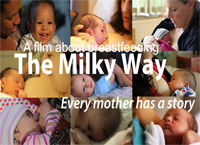The Milky Way
Every Mother Has a Story
The Milky Way is a film to empower mothers. The Milky Way reveals the real power vested in women's bodies and how that affects their babies -- even the tiniest of preemies. This profound capacity inherent in a woman's body has been ignored, overlooked and dismissed since the time that providing women's health care became lucrative.
In the 1970s, when I was a young woman having babies, I thought that the feminists of the day had left out a whole realm of my life in their struggle for equality. When I gave birth to my babies and breastfed, I found a source of power from within. But these profound life events have not typically found their way into feminist discourse.
Many in my generation of women were busy battling hospital rules, regulations and routines and fighting to humanize birth, while others were entering the work force and universities in droves.
Where does breastfeeding fit in the 21st century? In 1989, Penny Van Esterik presented a compelling argument that infant feeding is a feminist issue because it requires a decision that affects a woman's body and health, her child's health, her career, and more. She posits that nursing "encourages women's self-reliance, confirms a woman's power to control her own body, which challenges medical hegemony, challenges models of women as consumers and sex objects, requires a new interpretation of women's work, and encourages solidarity among women."
In order for women to succeed at both mothering and working outside the home, society must change to accommodate nursing mothers, and provide much longer paid maternity leave, flexible work arrangements such as flex-time, job-sharing, telecommuting and part-time options, pumping facilities, break time, paid paternity leave, child care options, and more. When we revamp the nursing mother's place in society, all women will benefit.
Exclusive nursing acts as a constraint against the medicalization of feeding babies. The simple but profound act of nursing a baby reinforces a woman's authority over her own body. This inherent authority naturally defies the medical hegemony that many women experience routinely. So many women are told their body is not good enough in a variety of subtle and not-so-subtle ways. "Your baby is loosing weight -- supplement with formula," "She has jaundice -- supplement," and so on. Once a woman decides to feed her baby from her own body, she often will also investigate healthy foods to ingest, and may take a higher level of responsibility for her own health and the health of her baby.
Breastfeeding re-constructs women's role from consumer to producer. A nursing mother does not have to buy milk for her baby. She produces it. She is the baby's own milk manufacturing plant. The current market value for human donor milk from a milk bank, is about $3.50 per ounce. Why is a nursing mother's milk not counted as a valuable commodity? Mother's milk should be included in every country's gross domestic product. Think about this for a moment. Water, when it runs through a line or is bottled, is counted in GDP. Water carried by women where infrastructure does not exist, is not counted. Why is that? It is water either way. Cow's milk is counted; mother's milk is not.
Breastfeeding refutes the cultural bent that breast's primary function is as sex objects. America has an uneasy relationship with breastfeeding and has a hard time facing the duality inherent in breast's function. Sex versus nurture, or sex and nurture? We don't seem to have any problem with the duality of our mouths, which can be for sex and for eating. We do not make people cover their heads with a blanket when they are eating in public simply because the mouth is frequently used sexually.
Nursing a baby has seldom been considered to be productive work. It is time that we re-frame how we view it. Nurturing activities have historically been thought to be non-productive, time wasting endeavors, and the position in society of those who perform these activities is low and they are either totally uncompensated, or poorly paid. There is no education or training required for them and they are not considered "professions."
We must re-define and respect nursing as productive work, not merely a reproductive function, so that we can move toward elevating and integrating mothers' place in the workplace and society.
There is one more thing to consider: Breastfeeding develops self-reliance in the baby, and causes the expression of competence in a baby not generally recognized by conventional medicine. A breastfed baby controls her intake. You cannot force feed a nursed baby. The baby eats at will and stops when full. Immediately after birth, if left undisturbed, a baby will find its way to the breast and self-attach. When baby sleeps with mama, it knows where the food comes from and can navigate to the nipple and self-latch. This is one of the protective factors against SIDS that breastfeeding and co-sleeping provide.
Nursing is so much more than food. It is time that we collectively see it as the profound act that it is and place value on the product, the process and the mother.
